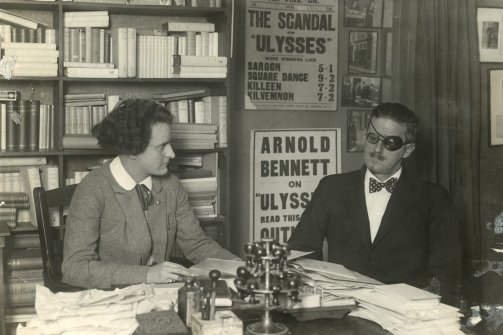The Ulysses Obscenity Cases: A Chronology

Sylvia Beach and James Joyce in 1922
1868
The English case of Regina v Hicklin establishes what will become for decades the dominant test for judging whether a writing is obscene. Rather than looking at the work as a whole or its effect on an average reader, Hicklin says a work is obscene if even a single paragraph might excite lust in a susceptible reader.
August 1910
John Butler Yeats introduces lawyer and art and manuscript collector John Quinn to Ezra Pound
1914
Margaret Anderson founds The Little Review.
1916
Jane Heap joins The Little Review staff.
May 1917
Ezra Pound, promising to bring leading literary figures like James Joyce to The Little Review, becomes a foreign editor for the Review. Lawyer John Quinn offers funding to pay for literary contributions.
December 1917
James Joyce sends his first episodes of Ulysses to Ezra Pound, who forwards them to Margaret Anderson for possible serialization in The Little Review.
January 1918
Anderson tells her readers that The Little Review will begin publication of “a prose masterpiece” (Ulysses).
March 1918
The Little Review publishes the first installment of Ulysses.
January 1919
The January issue of The Little Review, containing the “Lestrygonians” (7th) episode of Ulysses is suppressed by the Post Office. The following issue (May 1919) containing the 8th episode is also suppressed prior to mailing by the Post Office.
June 1919
The Little Review submits a memorandum to the Solicitor of the Post Office arguing against suppression of its May 1919 issue.
January 1920
The Post Office seizes and burns all copies of the January 1920 issue of The Little Review based on the alleged obscenity of Joyce’s “Cyclops” episode of Ulysses.
August 1920
John Sumner, secretary of the New York Society for the Suppression of Vice, issues a warrant for the arrest of Margaret Anderson and Jane Heap for violating New York’s obscenity statute with their publication in The Little Review of the final portions of the “Nausikaa” episode of Ulysses in their July-August issue.
October 21, 1920
A preliminary hearing is held in The Little Review case and a trial on the merits is ordered.
February 1921
The Little Review obscenity trial takes place before three New York judges. Anderson and Heap are convicted, ordered to pay $50 each, and prohibited from publishing any further installments of Ulysses in their magazine. The decision is not appealed.
March 1921
Sylvia Beach offers to publish Ulysses in France under the imprint of her bookstore. Joyce accepts the offer.
February 2, 1922
On Joyce’s 40th birthday, Ulysses is published in Paris.
1923
The Clean Books Committee is established in New York with the goal of pushing for stronger obscenity enforcement.
1924
Judge Learned Hand is appointed to the 2nd Circuit Court of Appeals by Calvin Coolidge.
July 1926
Samuel Roth published an unauthorized, expurgated version of Ulysses in the United States.
March 1927
James Joyce files a right of publicity lawsuit against Roth for publishing an unauthorized and expurgated version of his book. Roth consents to an injunction against further publication.
Summer of 1931
Morris Ernst, general counsel of the ACLU, begins plotting a legal campaign to legalize Ulysses in the United States.
December 1931
Ernst and Bennett Cerf, publisher and co-founder of Random House, discuss their mutual interest in seeing Ulysses published in the U.S.
Spring 1932
Bennett Cerf retains Morris Ernst to lead the legal fight to allow publication of Ulysses by Random House. Ernst arranges for Joyce to mail a copy of Ulysses to Cerf, while also ensuring that the book would be seized upon entry by U.S. Customs, thus setting up a challenge to federal obscenity law under the Tariff Act of 1930. The case is assigned to Judge John Woolsey.
December 6, 1933
Judge Woolsey rules that Ulysses is not obscene and must be admitted into the United States. Within minutes of hearing of the decision, Bennett Cerf instructs typesetters at Random House to start work on the book.
January 1934
One hundred copies of Ulysses are published to obtain U.S. copyright.
1934
A three-judge panel of the 2nd Circuit hears the case, and affirms Woolsey's ruling by a two-to-one vote in United States v. One Book Entitled Ulysses by James Joyce. Augustus Hand authors the opinion, in which his cousin, Learned Hand joins. The decision rejects the Hicklin test and says that courts should look at whether, taken as a whole, the work incites lust in the average reader. The United States does not appeal the ruling.
